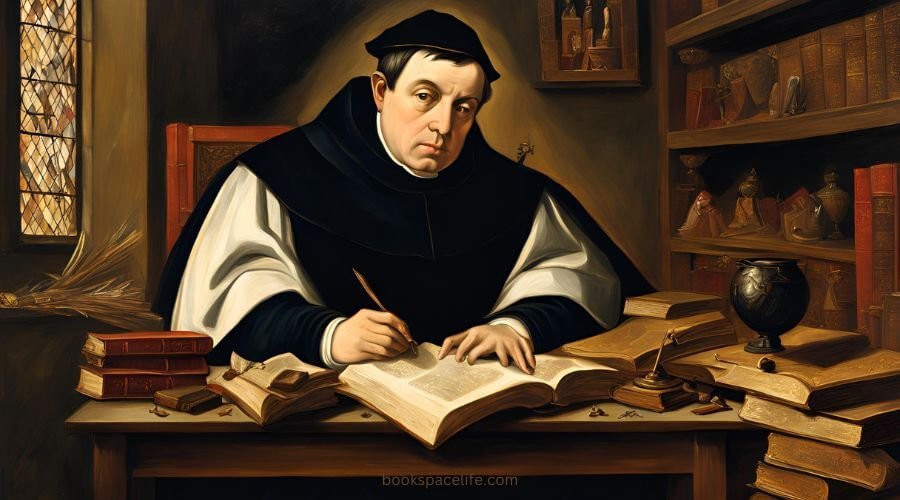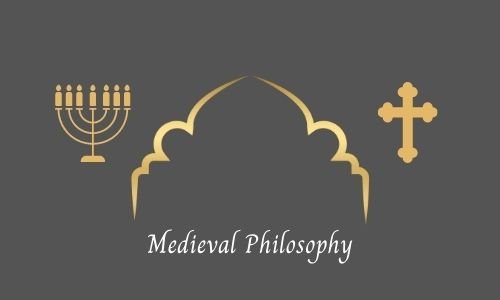Philo of Alexandria
Thomas Aquinas: The Angelic Doctor of Medieval Philosophy
Thomas Aquinas (1225 – 1274 CE), a towering figure in medieval philosophy and theology, is best known for his efforts to reconcile faith and reason within the framework of Christian doctrine.
Born in the 13th century, Aquinas synthesized Aristotelian philosophy with Christian theology, profoundly influencing Western thought and the Catholic Church.
His writings remain foundational for Catholic theology and continue to inspire philosophical inquiry today.
This blog post explores Aquinas’s life, travels, education, philosophical contributions, and enduring impact.
Table of Contents
(1) Early Life and Education
Thomas Aquinas was born in 1225 in the castle of Roccasecca, located in the region of Lazio, Italy.
He was the son of Landulph of Aquino and Theodora, members of the noble family of the Counts of Aquino.
Thomas was the youngest of several siblings, and his upbringing in a well-to-do family provided him with access to education and influential connections.
From an early age, Thomas displayed a keen intellect and a profound interest in learning. His family intended for him to pursue a career in law, but his interests soon gravitated towards theology and philosophy.
At the age of five, he began his formal education at the Benedictine monastery of Monte Cassino, where he was exposed to the teachings of the Church and the study of classical texts.
(2) Early Education and Travels
Aquinas’s quest for knowledge led him to various educational institutions. Around 1239, he joined the University of Naples, where he studied liberal arts, philosophy, and theology.
It was here that he was first introduced to the works of Aristotle, which would later play a crucial role in shaping his own philosophical thought.
In 1244, seeking a more profound spiritual life and intellectual environment, Thomas joined the Order of Preachers, commonly known as the Dominicans.
This decision shocked his family, who had other plans for him, particularly a prestigious position in the Church.
However, Aquinas remained steadfast in his commitment to the Dominican Order, emphasizing preaching, teaching, and a life of poverty.
His travels took him throughout Europe, where he continued his studies and engaged with various intellectual circles.
In 1245, he moved to Paris to further his education at the University of Paris, which was one of the leading centers of learning in medieval Europe.
During this time, he studied under influential theologians, including Albertus Magnus, who would become a key mentor in his life.
(3) Philosophical Contributions
Aquinas’s philosophical work is extensive, encompassing metaphysics, ethics, epistemology, and political philosophy.
His synthesis of Aristotelian philosophy with Christian doctrine laid the groundwork for what is now known as Thomism. Here are some of the key themes in his philosophy:
- Faith and Reason: One of Aquinas’s most significant contributions is his assertion that faith and reason are complementary rather than contradictory. He believed that human reason can lead to truths about God, morality, and the nature of existence, but that faith provides insights that surpass human understanding. This synthesis is prominently featured in his most famous work, Summa Theologica.
- The Five Ways: In Summa Theologica, Aquinas presents five arguments for the existence of God, known as the Five Ways. These arguments are grounded in natural theology and aim to demonstrate God’s existence through observation of the natural world:
- The Argument from Motion: Aquinas argues that everything in motion must have been set in motion by something else, ultimately leading to the Unmoved Mover, which he identifies as God.
- The Argument from Causation: This argument posits that every effect has a cause, leading to the necessity of a first cause, which Aquinas attributes to God.
- The Argument from Contingency: Aquinas suggests that because things exist contingently, there must be a necessary being that causes existence, which he identifies as God.
- The Argument from Degree: Aquinas argues that varying degrees of perfection in qualities such as goodness and truth imply the existence of a perfect being, which is God.
- The Teleological Argument: This argument posits that the order and purpose observed in the universe suggest the existence of an intelligent designer.
- Ethics and Natural Law: Aquinas’s ethical philosophy is grounded in the concept of natural law, which asserts that human beings can discern moral principles through reason. He believed that moral laws are rooted in the nature of human beings and reflect the eternal law of God. Aquinas distinguished between different types of laws, including divine law, natural law, and human law, emphasizing the importance of aligning human actions with moral truths.
- Political Philosophy: In his writings on political philosophy, Aquinas argued for the importance of justice and the common good. He believed that rulers should govern in accordance with natural law and seek to promote the welfare of their subjects. Aquinas’s ideas on governance and justice laid the groundwork for later developments in political theory.
(4) Influence and Impact
Thomas Aquinas’s influence extends far beyond his lifetime, shaping the course of Western philosophy and theology in profound ways:
- Catholic Theology: Aquinas’s works became central to Catholic theology, and his ideas were formally adopted by the Catholic Church in the 16th century during the Council of Trent. His synthesis of faith and reason, as well as his ethical principles, continue to guide Catholic teaching today.
- Scholasticism: Aquinas is often regarded as the pinnacle of scholasticism, a medieval intellectual movement that sought to reconcile faith and reason. His methods of inquiry and analysis set a standard for future theologians and philosophers, influencing figures such as Duns Scotus and William of Ockham.
- Renaissance Humanism: During the Renaissance, Aquinas’s works were rediscovered and became influential among humanist scholars. His emphasis on human reason and the potential for human flourishing resonated with the ideals of Renaissance thought.
- Modern Philosophy: Aquinas’s ideas have also shaped modern philosophy, particularly in the areas of ethics, metaphysics, and epistemology. His influence can be seen in the works of philosophers such as Immanuel Kant, who engaged with Aquinas’s ethical framework in developing his moral philosophy.
- Interfaith Dialogue: Aquinas’s approach to reconciling faith and reason has provided a foundation for interfaith dialogue. His emphasis on natural law and ethical principles resonates across religious traditions, promoting discussions about morality, justice, and the nature of existence.
(5) Later Life and Legacy
Aquinas spent much of his later life teaching and writing in Paris and Italy. He continued to work on his major theological texts, including the Summa Theologica and Summa Contra Gentiles, until his health began to decline. In 1274, while traveling to the Second Council of Lyon, Aquinas fell ill and died on March 7, 1274, in Fossanova, Italy.
In recognition of his contributions, Aquinas was canonized as a saint by Pope John XXII in 1323, and he was declared a Doctor of the Church in 1567, emphasizing his significance in Catholic thought. His feast day is celebrated on January 28.
(6) Conclusion
Thomas Aquinas remains a monumental figure in the history of philosophy and theology.
His profound insights into the relationship between faith and reason, his ethical principles, and his arguments for the existence of God have left an indelible mark on Western thought.
As we navigate contemporary philosophical and theological challenges, Aquinas’s legacy serves as a reminder of the enduring quest for truth, understanding, and the harmonization of reason and faith.
His works invite us to engage thoughtfully with the complexities of existence, ultimately guiding us toward a deeper appreciation of the divine and the moral imperatives that govern human life.








